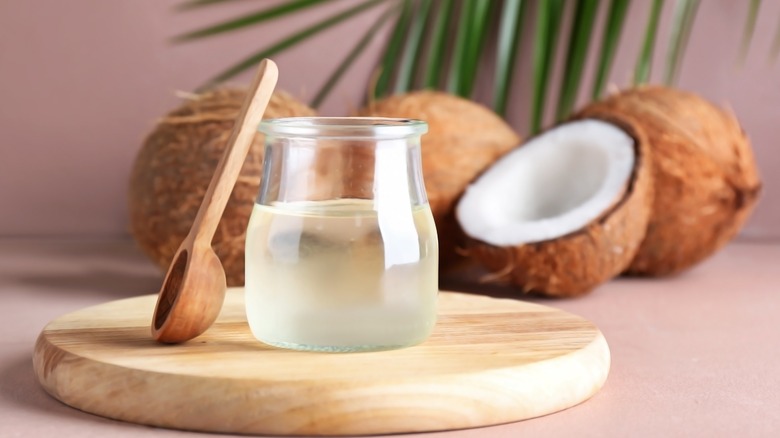The Common Mistake To Avoid When Baking With Coconut Oil
We may receive a commission on purchases made from links.
Watch any foodie influencer and you'll have likely seen them using coconut oil in myriad baking recipes, from high-protein energy balls and banana bread to creamy cookie butter. If you want to crank up the coconut in your culinary arsenal by following in their footsteps, avoid this common baking mistake; adding your coconut oil to cold ingredients while it's in its warm melted state.
If you've ever opened a jar of coconut oil on a particularly hot day, you'll know that it melts in warm conditions. With a melting point of 78 degrees, it's often used in its liquid form in vegan and plant based recipes as a substitute for butter at a simple 1:1 ratio. Plus, it's an awesome ingredient to incorporate into melted chocolate when you're after a shiny coating for cakes, an easy 2-ingredient topping for peanut butter cups, or a quick-flowing drizzle for oatmeal bars.
However, pouring warm coconut milk (that's been heated in the microwave or on the stove) over ingredients that are at a lower temperature can trigger it to solidify quickly, much like candle wax hardening on a cold table. This means that if you're making a cake that includes chilled fridge-cold ingredients, such as milk and eggs, you must bring them up to room temperature first before adding in your melted coconut oil. If you don't do this, you run the risk of the coconut oil re-solidifying and seizing upon contact, making it trickier to seamlessly incorporate it into batters and bakes.
Make vegan-friendly pie crusts with coconut oil
The best way to cook with coconut oil can change depending on what you're whipping up and whether you want to use it as a solid or liquid. For example, while you can use it to make vegan-friendly pie crusts in its solid state (which is similar to the waxy texture of lard and tallow), you may need to chill your prepared pastry before baking it to allow the oil to solidify again after its been handled with warm hands. It's easier to use melted coconut oil in wet recipes, such as cake batters and muffins, that have a looser consistency because it melds in quickly like a cooking oil and doesn't need to be refrigerated before baking.
If you're using coconut oil in a recipe where you'd like its nutty flavor to come to the fore, consider selecting an organic, virgin coconut oil over a regular one. Organic versions are less refined and therefore retain more of their mild aroma and nutrients. All varieties of coconut oil are shelf-stable but organic ones can last for up to five years whereas refined options last 18 months. However, with so many awesome uses for this versatile oil, it's likely you'll use the entire jar well before it expires.

